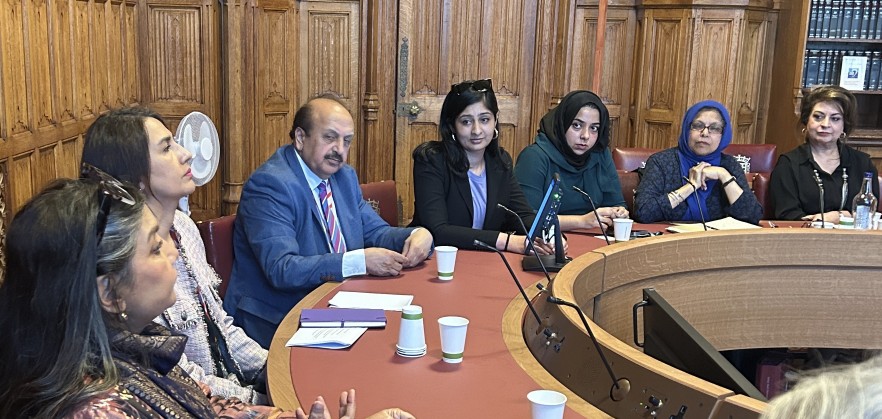
By Shaista Gohir, CEO of MWNUK
“My parents supported me in whatever I wanted to do – as long as I promised to be the best in whatever I chose.”
At the House of Lords, I hosted a question and answer session with Shabana Azmi, which was attended by MPs and peers from across the political parties, as well as other guests, including media representatives. The actress was praised for being a pioneer for portraying women as strong willed and bold, which was unconventional in the 1970s and 1980s. However, she credited the writers and directors for having the courage to make such films as that had given her the opportunity to bring these female characters to life, roles that resulted in many best actress awards. We also found out how Shabana’s love for acting started as a child because of her mother, Shaukat Kaifi, a respected theatre actress: “My mother took me on tour during my vacations and Prithvi Raj Kapoor also made costumes for me so it was natural for me to be on stage.”
Shabana’s on screen social activism has also been matched by her off screen human rights activism for which she has won many accolades including the Gandhi International Peace Prize in 2006 and the Crystal Award at the World Economic Forum. She has also been given five Honorary doctorates. Shabana spoke about how her attitude was shaped at a young age because of her father, renowned poet, Kaifi Azmi, who used his poetry to give voice to the poorest in society. She recalled: “My work is really an extension of what I learnt as a child, my father took me to meetings.” This had led to Shabana championing the rights of slum dwellers and so she shared a story of when she went on a five-day hunger strike to bring attention to their cause. Another childhood incident she shared included as a seven-year old wanting a blonde blue-eyed doll like all the other girls in her class but her father bought her a black doll and told her that it too was beautiful. She said: “These little incidents just stay with you.”
Both of Shabana’s parents have clearly had a profound influence on her life: “My parents supported me in whatever I wanted to do – as long as I promised to be the best in whatever I chose.” And indeed, she has certainly been the best actress and the best human rights activist because she recognises the power of her privilege and voice and wants to actively use it to do good: “As an actor you should be connected to life and reality and what is around you and you should use the tools and power you have at your disposal to open any doors you can.” Shabana has also taken over her late father’s charity, Mijwan Welfare Society, which he set up to empower women and girls in a rural part of India (Azamgarh, UP). She explained how she helps them: “Empowerment involves providing skills for the long term, it’s important to build their sense of self-worth. For example, we provide training to empower women to earn their own money, which changes the power structure - women are now seen as assets and not liabilities and therefore also involved in the decisions.”
“I'm a woman, I'm a mother, I'm an actor, I'm an activist, I'm so many things, and I'm also Muslim.”
As we know, the film industry in the West lacks diversity and Shabana was asked how this could be addressed. She advised that more casting should be done in a colour-blind way i.e. unless the ethnicity is crucial to the character, be willing to cast a person of colour, which in turn should not necessitate having to change the character’s details such as name: “In Steven Spielberg’s, Halo, we are finally breaking down some of the barriers in casting actors. I play a role that is suited to me, not just because I am South Asian because I play a character called Admiral Margaret Parangosky. I’ve not been asked to change anything about myself, my accent, my skin colour etc. This is an example of going colour blind.”
Talking of identities, we also touched about Shabana Azmi’s identity as a Muslim woman. She finds it frustrating that people too readily only single out her Muslim identity and put her in a box because she says being Muslim is only one part of her identity: “I'm a woman, I'm a mother, I'm an actor, I'm an activist, I'm so many things, and I'm also Muslim.” Shabana takes a secular approach and fights to ensure everyone is treated equally regardless of religion or any other identity marker. She also spoke passionately about this in her Sky News interview with Yalda Hakim during her UK trip.
As the meeting with Shabana was held in one of the Committee Rooms of the House of Lords, I could not offer her any tea. However, I did present her with posh House of Lords tea cups and saucers, a gift I had bought for her along with a picture of parliament. Hopefully when she uses them for a cuppa, she will remember our day together. On her way out before I waved her goodbye, I asked Shabana one more question, what advice she would give to her younger self. She replied: “Keep doing what you are doing and do more of it.” I will happily take this advice for my older self.
Join Our Movement
Raise your voice and get connected

 3
3